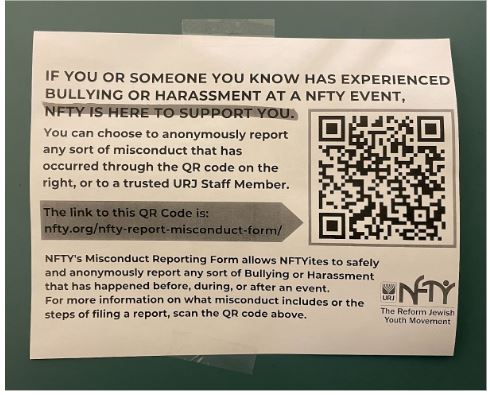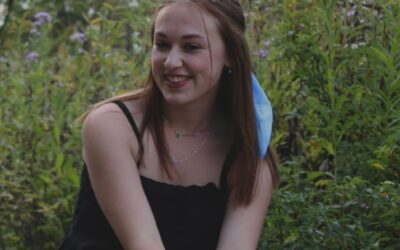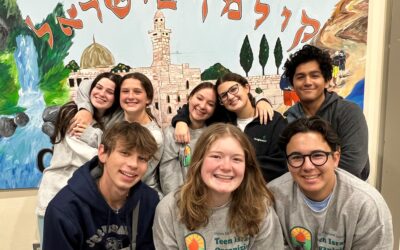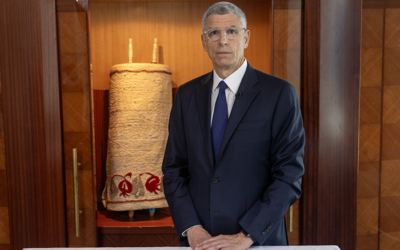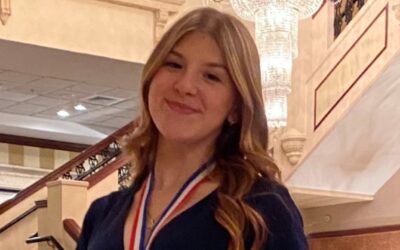By: Riley Genevieve Miner | NFTY’s 5781-5782 Membership Vice President
While I wish I could summarize what it means to serve on NFTY’s North American Board, the experience is indescribable. The teens who you serve on board with become your best friends and biggest cheerleaders and the many adults who you connect with become trusted mentors who are always there to support initiatives that you want to lead. This blog post was initially written last May, but comes to you as new leaders in NFTY, the Reform Jewish Youth Movement, begin to start their work in making NFTY a more inclusive space for all teens.A little over two weeks ago, in mid-May, I got off the bus at my final NFTY event as a participant and teen leader at the URJ Eisner Camp with NFTY NAR and NFTY NE. When getting off the bus, I saw about 50 teens smiling from ear to ear. Some of them were just starting their NFTY journeys, while others would soon be saying goodbye to NFTY around a campfire in the rain.
If you were to ask many of these teens what NFTY means to them, you will probably receive answers similar to the following: home, community, friendship, love, or acceptance. While I highly resonate with all of these answers, my first answer is “my safe space”. Over the past 7 years, NFTY and Jewish youth spaces have become a space where I feel comfortable being myself whether I am rocking out during song session or talking about the importance of prioritizing mental health in relation to our Jewish values.
One of the most influential programs I have ever sat through was centered around the importance of consent in the sacred space that we build and how NFTY’s principles and our Jewish values show us the importance of mutually respecting people’s physical and emotional boundaries. While this program started off with the famous TED talk that breaks down a new metaphor for consent as someone’s relationship to pizza, it followed with small group discussions where we each paired with a friendly face to have a one-on-one conversation. As I talked to my partner about the video we had watched and how the concept of consent related to many of our jewish values, I could feel the passion and dedication that all of the teens in the room had towards assuring that consent was an active part of their daily activities, whether we were referring to putting our arms around each other during song circle or borrowing a t-shirt for maccabiah.
Since that program during the summer of 2019 at the URJ Kutz Camp, NFTY has changed and shifted. During the past few years, NFTY NAB members have led task forces dedicated to strengthening our inclusive community and eliminating bullying and harassment in our spaces. And in February of this year, the URJ published the Independent Investigation regarding ethical concerns related to harassment, gender bias, and other forms of inequitable treatment. The 126 page report presented by Debevoise & Plimpton detailed the sexualized culture that has existed in many URJ spaces, including the teen spaces that many teens, like myself, call home. As I read through the report, I had a range of emotions from being angry and upset that such things could happen, to being grateful that the URJ realized that there was an issue and decided to go through an independent, comprehensive, and impartial investigation into sexual harassment, abuse, and misconduct. Following being on a call with the rest of my board, NFTY staff, and URJ staff, I felt a need to act or respond as current and future NFTYites raised questions over what this report meant.
Many of the recommendations for NFTY and other URJ teen spaces were about ensuring there was training for all adults who staffed events and that the teens attending events should also participate in consent and anti-bullying training and be aware of places where they can report any acts of misconduct. Based on these recommendations, NFTY staff assembled an asynchronous course that all adult staff members attending events were required to participate in. While this was a start, I began to think of what teens had done in previous years and what could be improved upon. This conversation started with looking at the current system in place where teens could report bullying, sexual harassment, or other forms of misconduct, and making the form more accessible and comprehensible by adding the link on many webpages on nfty.org, into the Brit Kehillah that teen leaders read at the start of events, and onto signs that would be posted into the bathrooms at events, as shown below.

Photo taken at NFTY NAR & NE Spring Kallah at URJ Eisner Camp in mid May
As this idea became a reality, it became very clear that as we returned to in-person events, there was much more that could be done to assure that the 1,400+ teens attending events across North America would feel comfortable in the spaces that they would be in at camps and congregations. This sparked the idea to have all regional board members complete a bystander intervention course that I designed with the help of the rest of the board. This course would train teens on ways that they could intervene in situations involving misconduct and have these same teen leaders run programs and discussions surrounding consent and what it means to gather in the safe and sacred spaces that we create.
Prior to getting off of the bus at Eisner, both NFTY NAR and NFTY NE’s regional boards had completed this training, and within the seconds that I got off the bus, a regional board member had reminded participants that it was important to ask people if they were okay with hugs as everyone began to welcome each other into the community. Later that evening, I was able to see how both of the regional boards were able to bring all teens together to talk about how consent was important and how, while NFTY events are a space where we build meaningful relationships, it is important to value the lasting friendships that we create in our community.
Throughout the weekend, I was able to see how both of these regions worked to make their programs more inclusive, and I even had an opportunity to work with the NFTY NAR board to run a program about inclusion and leadership and what steps leaders can take to make spaces more welcoming and inclusive for all teens. The efforts to make NFTY spaces safer has been something that started decades ago and will continue into the future as NFTY’s first Engagement and Inclusion Vice President begins their term. I am so grateful that I have been able to be a teen leader that has made an impact on NFTY’s inclusion practices, and I cannot wait to continue this work by serving on the URJ Ethics Accountability Task Force.
I would like to say thank you to both NFTY NAR and NFTY NE regional boards for welcoming me into your space as a teen leader, and a thank you to Rose Snitz and Devon Barker for serving as phenomenal adult partners to the teens and I and supporting teens in creating the safe space that was made. I would also like to say thank you to Michelle Shapiro Abraham, Julie Marsh, and Lynne Butner for being adults who have supported myself and other teen leaders in making NFTY spaces safer for all teens.
L’hitraot NFTY, I will see you soon, but as an adult mentor!
Riley Genevieve Miner
NFTY’s 5781-5782 Membership Vice President
—-
If you are interested in furthering inclusion efforts in NFTY, or have questions or concerns, reach out to NFTY’s 2022-2023 Engagement and Inclusion Vice President, Cameron Joseph Samuels at nftyeivp@nfty.org
